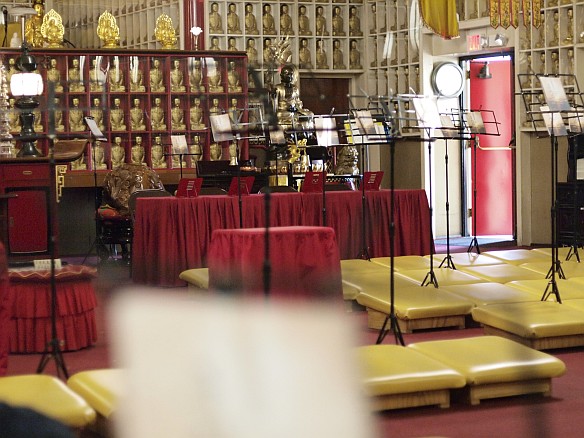[Admin’s note: This spring, volunteers and staff participated in a 7-day Guan Yin Practice Retreat. During the Guan Yin session, participants recite the name of Guan Yin Bodhisattva. In our Chan tradition, meditation brings the mind back to whatever method of practice we are doing, whether it’s mental awareness, reciting, bowing, etc… Inevitably, the mind wanders off, and we gently bring it back. Once familiar with the motion of wandering off, we see what compels the mind to stray and develop a resistance against the habituation of that e/motion.]
Day 1: Tired from the cold and rain; finishing up earlier work. Then went to session. Felt better after 1.5 hours. It’s not that I have less false thinking, but I can separate from my thoughts and hear them more clearly—even though I’m more tired.
Day 2:
[Notes from evening lectures with Doug Powers]
DP: Every time you have trouble with your body or mind, it’s an opportunity to work through your impediment. It’s very simple.
DP: Cultivation is developing the resistance against your habituation.
DP: In a Guan Yin Session, whatever is coming up is what you need to be dealing with.
DP: A better definition for faith is confidence; believe in what you are doing in your process.
Day 3: Had the recurring affliction again. In the afternoon, after getting lost or stuck in the same mood and thought patterns, I recall a number of things:
- Try another method if the one that you’re using still makes you drift off (DP). People have affinity with different methods e.g. visualisation.
- The Buddhas and Bodhisattvas are like coaches, and they want you to succeed (Rev. Heng Sure)
- DP mentioned that for him, doing the the Guan Yin reminds him of the Goodness of the Universe.
So, I recited, trying not to visualize with an image. Instead, I visualized an energy of goodness surrounding me, cheering me on. It really worked. It helped motivate and energize me, knowing that there’s something good to believe in—something truly good that wants me to succeed.
By reciting, I can tap into that energy of goodness, and I can believe in it. I can also believe in my own goodness—my ability to become that and manifest it to the outer world.
Day 4: Slept in this morning and missed most of the morning Guan Yin session. Made it to the afternoon session. Oh no, I thought I had banished the earlier afflictions, but they are back. Concentration doesn’t seem to be there like the day before. However, afflictions don’t seem to be as strong, which is actually good and bad. I still get lost in my thoughts, but it’s harder to identify them.
It seems better to keep applying effort. Don’t seek, but don’t give up: the Middle Way.
Day 5: A thought came to mind: even if I can’t always be in a full-day retreat or rally up that energy of goodness, the experience taught me not to let my stress, fears, projections, and habits define my horizon. Instead, I can remember that there is a place to operate beyond that limited horizon.
Day 6: Feel like I plateaued. Maybe it’s because I’m not sleeping well. Slept too much, and it was too noisy.
even if I can’t always be in a full-day retreat… the experience taught me not to let my stress, fears, projections, and habits define my horizon.
Did have an insight, either from this morning or last night: I used to treat Buddhist practices more like going to the gym—suffer through 30 minutes or so of repetitive activity and get more fit afterwards. With Buddhist practices, you do something for a period of time, and you shed the weight your afflictions have on you.
In an intense session, there’s immediate feedback on what you did and your ability to bring your mind to that singular focus—we’re talking hours instead of days. It’s like this laboratory of the mind that Marty (Prof. Verhoeven) speaks of. Sleep less—concentrate better. Eat more—mind groggy. I do feel it’s a lot more of a dynamic interplay.
After the session: Feel a lightness, focused steadiness, and well-being that I wasn’t aware of until I left the retreat. My mind still wanders off. Vanquishing all my afflictions at once may be too much to hope for, but maintaining this—the interplay, feedback and inner laboratory of seeing my mind’s workings and my actions—is what I want to carry back after the session is finished.

